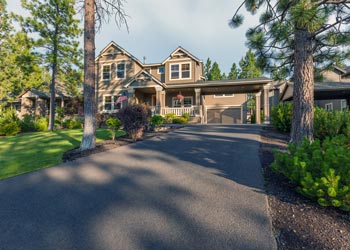
We can repair cracks, potholes, and other surface-level damage. But you'll need to replace your driveway once there's damage to the foundation. With proper maintenance, your residential driveway may last between 20 and 35 years.
When it's time to replace, you have a few options for your driveway. These include porous, warm-mix, hot-mix, and recycled asphalt.
Here's what else you need to know before you repave your residential driveway.
Porous Asphalt
The soil does a pretty good job of filtering out contaminants from runoff. The only problem is that a lot of the rainfall in cities flows over asphalt, roofs, and other hard surfaces. As a result, a lot of our storm water goes into the local sewer system. This storm water may also carry a lot of pollutants such as fertilizer, pesticides, and oil.
But porous asphalt is different from other paved surfaces. When it rains, the water seeps through the so it can reach the soil below. From there, the rain filters through the soil and replenishes the water table.
If you live in an area that gets a lot of rain, consider porous asphalt for your driveway. Porous asphalt can reduce the stress put on our sewer systems. It can also help prevent flooding on your property by absorbing heavy rainfall.
Warm-Mix Asphalt
is about 30 to 120 degrees cooler than traditional hot-mix asphalt. This helps us to better compact the asphalt. It also increases the likelihood that we'll be able to recycle the asphalt later.
Warm-mix asphalt can help us expand the typical paving season. For example, we may be able to do more work during the early spring or late fall.
Hot-Mix Asphalt
Unlike concrete, hot-mix asphalt is easier to repair. We can even resurface your asphalt driveway if the damage is only on the top layer.
We'll need to wait until the temperature outside is above 50 degrees Fahrenheit. Our crew will also need dry weather conditions before they can pave. This will ensure that your new residential driveway lasts for years to come.
Recycled Asphalt
Did you know that asphalt is the most recycled material in the United States? According to the Federal Highway Administration, the U.S. uses 75 million tons of recycled asphalt each year.
Since asphalt is 100% recyclable, we're able to keep a lot of it out of landfills. Recycled asphalt is also as long-lasting and durable as virgin materials.
Here's how the recycling process works.
First, a company will load millings and large broken pieces of asphalt into the recycling machine. Next, they’ll tumble the materials for about 20 minutes at a temperature of 300 degrees.
They'll continue tumbling the materials until they reach the consistency needed for paving. Once this happens, they'll mix the recycled asphalt with virgin materials.
Learn More: How Does Asphalt Recycling Work? →
Request a Free Estimate With A-1 Asphalt
A-1 Asphalt is a reputable driveway contractor that’s proud to serve Greater Grand Rapids. To request a free estimate for a new residential driveway, please call A-1 Asphalt at (800) 871-4401. You may also fill out our online contact form and someone from our team will reach out to you soon.
This blog post has been updated.